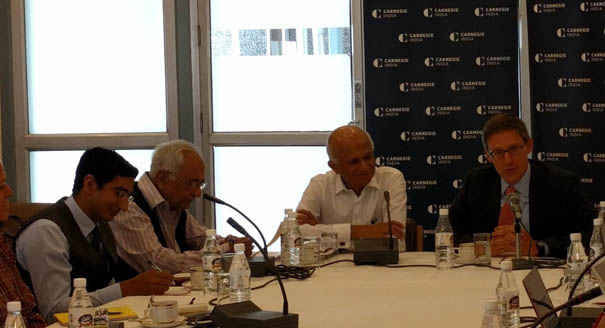Registration
You will receive an email confirming your registration.
Carnegie India, in collaboration with the India International Center, hosted a roundtable discussion with Derek Chollet, counsellor and senior adviser for security and defense policy at the German Marshall Fund of the United States (GMF) to discuss his latest book, The Long Game: How Obama Defied Washington and Redefined America’s Role in the World.
Having served in the White House, Pentagon, and the State Department, Chollet possesses the unique capacity to delve deep into the rationale behind U.S. President Barack Obama’s decisionmaking. The discussion was moderated by Ambassador Ranjan Mathai, former foreign secretary of India.
DISCUSSION HIGHLIGHTS
- A “Checklist,” Not a “Doctrine”: Obama does not purport to have a singular foreign policy doctrine, as complex geopolitical realities are always contingent on circumstance. However, Chollet contends that there are a few key principles that emerge as themes in Obama’s foreign policy checklist: balance, sustainability, restraint, precision, patience, fallibility, scepticism, and exceptionalism.
- Limits to Power: In an era defined by “pivots” and “resets,” the United States has maintained a precarious balance at home and abroad. As an indispensable partner to many, the United States faces dramatic challenges with the Middle East’s political and demographic upheavals, the European Union’s increasing disenchantment with its own founding principles, and increased geopolitical competition within Asia. As more nations vie for American resources in the form of military or economic engagement, the Obama era has been characterised by the realization that the United States cannot be an omnipotent power. Moreover, Obama’s focus on ameliorating the domestic upheavals of the Bush years proved that guns and butter are inextricably linked, as it is impossible to project power externally with weak internal foundations.
- Managing Outcomes: Obama’s balanced approach to security strategy has come about through the practice of great restraint and the wisdom to make difficult choices. His choice to abandon posturing for sustainable policies that bolster prosperity in the long run is a good example of his particular brand of cerebral policymaking. In Syria, for example, the United States has pushed for a managedtransition. While toppling a regime may have won accolades in the short run, Obama’s team recognized that a patient diplomatic approach is necessary to bring about a sustained peace.
- Credibility Incumbent on Choice: Obama believes that America’s great strength is in its ability to draw on the wisdom gained from past mistakes in order to strive toward further progress. He is a great believer that the willingness to acknowledge and draw upon past mistakes is a source of strength that enables the country to constantly strive toward further progress. He believes denying past failures would undermine American legitimacy, which is not divinely ordained but constantly earned through the choices the United States makes.
- Indo-U.S. Relations: Chollet emphasized that Obama’s calculated decisionmaking has only deepened the Indo-U.S. relationship. He deemed the bond one of the few truly bipartisan foreign policy achievements in the last two decades. Participants agreed that capability transfer, maritime cooperation, and technology collaboration are fields with tremendous potential for further collaboration. Participants emphasized that the bipartisan relationship stands on its own, and is one founded on common values rather than as a response to regional powers in the subcontinent.
- Pakistan, a Disappointment: Chollet expressed that Pakistan has been an immense disappointment for the Obama administration. It has derailed progress in Afghanistan and has fostered terrorist groups and facilities. Participants deliberated on what a new U.S. administration’s South Asia policy might look like, agreeing that the United States has effectively de-hyphenated India and Pakistan, and has built a robust foundation upon which to build independent relations with each.
- Multipartner not Multipolar: Chollet emphasized that Obama has tried to diversify the approach to the structures within which the United States interacts with other countries by emphasizing multipartner relationships rather than multipolar competition. Obama has fostered deeper regional relationships. Chollet attests that Obama’s approach to policymaking is like an aircraft carrier: it takes infinitesimal five-degree turns which may seem negligible in the short term, but in the long run results in a major change of course.
This event summary was prepared by Arushi Kumar, a research assistant at Carnegie India.
